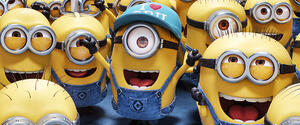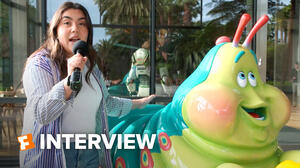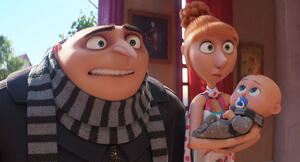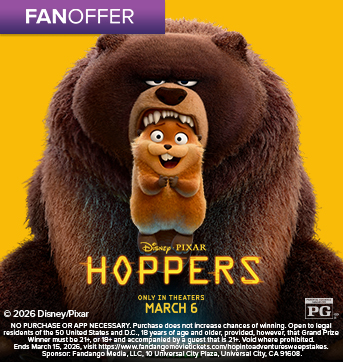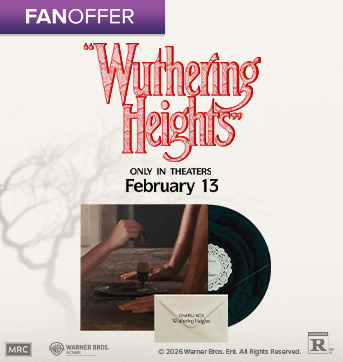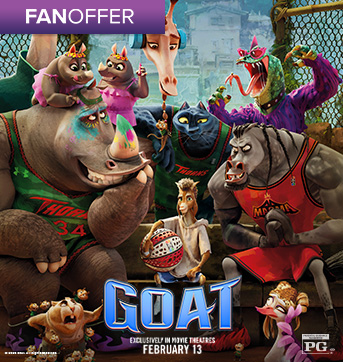While I don’t feel films should be scapegoats for society’s ills, I do believe that movies can inspire us, kids and adults, to look at things in a different way and to consider the actions needed to become better versions of ourselves.
The overwhelming majority of movies I see these days are family films that we all watch together. They contain scares, laughs, music and heartbreak. In terms of pure entertainment we tend to get our money’s worth. On occasion, we also get something important worth talking about. Topics like death, violence, love, drugs, friendship, authority, bullying—they’re all there, and the characters deal with each in any number of ways. It is up to us, the parents in the audience, to take those conversations a step further and discuss them with our children rather than let Hollywood have the last word (even if we agree with it). It’s amazing how often we benefit from the discussions, too.
Here are three instances where films have inspired (or reinforced) my parenting style:

1. Films from my own childhood like The Goonies and E.T. were mirrors to my own life (although I knew, unfortunately, fewer pirates and aliens). They amplified my own lust for adventure, distrust of “the man” and bonds of friendship—I grew up seeing myself as a kindred spirit to those gangs of the silver screen and, to be fair, I still do. That said, what those kids were doing was often reckless and dangerous, and while my wife and I are fans of letting the boys choose their own adventures and trust them to make their own decisions (and deal with the consequences thereof), as a parent I can’t help but think that everyone would have been a lot safer a lot sooner had the children felt comfortable talking to their parents (or had the parents actually listened). Basically, if my boys are being chased by criminals and/or the government, I want to be in the mix.
The inspiration? To better establish and maintain open, clear and honest dialog with my children.

2. One of the biggest complaints that people like to make about animated films, especially those created by Disney like Frozen, Bambi and The Lion King, is that parents are often unavailable (at best) or die way too early in the story. Why does it happen? I don’t know; however, I do know that it isn’t something I choose to get upset about. One point I make, often, is that it is wonderful if your child has two loving parents that are incredibly active in their life, but there are countless children who don’t have that as their normal, and their reality is far different, perhaps closer to the family dynamics portrayed in the film. Which version of the story does the greater good versus the most damage: one that inspires kids to overcome moments of loss and adversity, or one that offends parents because they think their life is perfect? Either way, that is not the takeaway that I have found in such plot twists. Rather, the loss of parents in family films reinforces my own mortality and reminds me that we should never take anything for granted. There is no guarantee that we will always be here for our kids and there is no time like the present to spend that time with them. In addition, when our time does come it will always be too early in the story and the love and lessons we create now are the support and confidence that our children will know later.
The inspiration? Live the life we’re given with every moment we have.

3. We have all heard the horror stories of growing up, the cliques and meanness of middle school, the hierarchy of wedgies and nasty notes, and we may have done our part to prove them right. We lived it. We know. That said, just because a movie suggests that certain traits, shapes and passions must provide our label does not make it true—even those same movies understand that by the third act. Inside Out, Shrek, The Iron Giant and Wreck-It Ralph, among so many others, all deal with the perception of self versus the way the world sees us (or how we believe the world sees us), the acceptance of labels and our confrontations with the same. This is the good stuff. Just because a person dresses a certain way or enjoys one thing more than another should not define them—and when definitions do come into play, it is never the right of others to design the description. Only we, in the royal sense, have the ability to know ourselves and to face the world accordingly.
The inspiration? Encourage kids to be themselves and not worry about what other people think. If that doesn’t sink in wait a few years and show them The Breakfast Club.
The moral of this story: It is rather silly of people to blame their personal problems on a collection of frames per second, but finding inspiration in movies? That’s worth the price of admission. We can all always be better.
Whit Honea is the author of The Parents’ Phrase Book and his personal website the Honea Express. He lives in Los Angeles with his wife, two sons, and too many pets.

